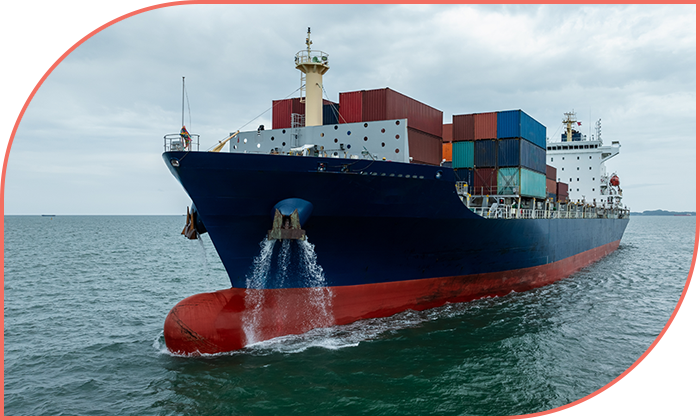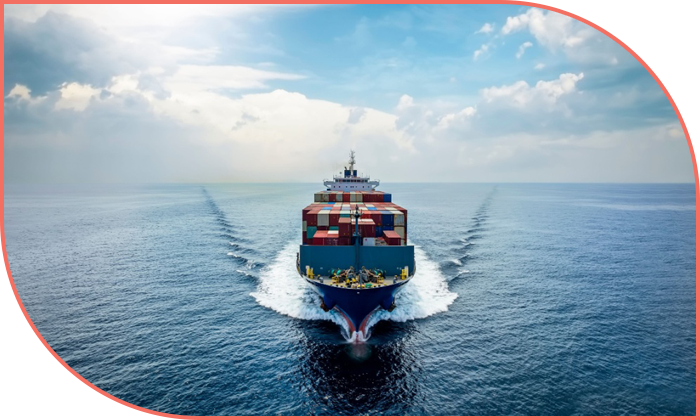Sea Freight From China To UK
What is ocean freight?
Ocean freight is the transportation of goods by sea.
It is a critical component of international trade and allows for sea shipping from China to UK. Sea freight is favoured by businesses for its cost-effectiveness and capacity to handle large, heavy, or bulky shipments that might not be viable for air freight.
LCL (less than container load)
Less-than-container load (LCL) is an option for shippers who do not have enough goods to fill a standard container and must, therefore, share container space with other shippers.
FCL (full container load)
Full Container Load (FCL) refers to the shipping of goods in ocean freight containers used exclusively by a single shipper.
Compare China Ocean Freight Shipping Rates in Seconds
Get instant quotes from leading ocean freight providers. Find the best rates for your shipping needs in one place.
How does sea freight work?
Once the goods are containerised, they are transported by truck or rail to the nearest port, such as Shanghai, Ningbo, or Shenzhen. Here, the containers are loaded onto a cargo ship.
All goods must be cleared through Chinese customs prior to loading. This process, overseen by the exporter and their freight forwarder, involves submitting documentation such as the commercial invoice, packing list, and export license.
Upon arrival in UK ports (e.g., Felixstowe, Liverpool, London Gateway), the containers undergo customs clearance – an essential step managed by the importer's appointed customs broker. UK customs requires detailed documentation to ensure all imports comply with local regulations.
Following customs clearance, the goods are released from the port and are ready for the final stage of their journey. Goods may be transported by truck or rail to the final destination or a distribution centre within the UK.

How much does shipping cost from China?
1. Goods
The type of goods being shipped via sea freight from China significantly influences the shipping cost, as some goods (e.g., fragile goods, perishable/hazardous items) have unique handling requirements.
2. Import Duty (customs and excise duty)
Import duties in the UK vary depending on the type and origin of goods.
Import duties include customs duty and, potentially, excise duty. To find out more about what you owe for sea shipping from China to UK, use the government’s Trade Tariff online service.
3. VAT
Value-added Tax (VAT) on imported goods in the UK is typically charged at 20% and calculated based on the total cost, including the value of the goods, shipping costs, and any applicable duties.
Details on VAT rates and exceptions for sea freight from China can be found on the UK government’s website.
4. Size and weight
The size and weight of the shipment directly affect costs. Heavier, larger shipments cost more due to the increased space they occupy on a cargo ship.
5. Freight class
Freight class refers to an item’s transportability and is determined by the National Motor Freight Traffic Association (NMFTA). It influences the cost based on factors like density, stowability, handling, and liability.
6. Marine insurance
Marine insurance covers the damage or loss of cargo, ships and any transport by which goods are transferred, acquired, or held between points of origin and final destination.
7. Customs clearance
Customs clearance fees are charges levied by government agencies. These fees are for processing the paperwork to clear the shipment through customs.
Costs can include the submission and preparation of electronic and physical documents, the calculation of taxes, duties, and excises, and facilitating communication between the importer and authorities.
The fees can vary widely but are essential for legal compliance.
Important documents used in sea freight from China
1. Bill of Lading
The Bill of Lading is a fundamental document in shipping sea freight from China to UK. It acts as a receipt for the shipped goods, a contract between a shipper and carrier, and a title document for the goods. It includes comprehensive details such as:
- Shipper and consignee names: The legal names and contact information of the cargo owner and recipient.
- Vessel and voyage number: Identifies the ship and the specific trip.
- Port of loading and discharge: Specifies where the goods are loaded and unloaded.
- Description of goods: Details about the cargo, including type, quantity, and weight.
- Freight details: Information on freight terms like prepaid or collect.
- Marks and numbers: Identifiers used on the package for handling and tracking.
2. Commodity code
Any goods travelling via sea freight from China to UK require a commodity code. This code identifies the type of products being shipped, their legality, and the amounts of import duty and tax to be paid.
3. Import licence
Depending on the nature of the goods, an import licence may be required for sea shipping from China to UK. Controlled goods like firearms, animals, and certain agricultural products will need a licence.
4. EORI number
The Economic Operator Registration and Identification Number (EORI) is mandatory for all businesses importing or exporting goods into or out of the UK. It is used as an identifier in all customs procedures and helps track and register UK customs information.
Find The Lowest Freight Rates Today
Compare shipping quotes from trusted providers. Get the best deals for ocean freight.
China to UK sea freight time
Route and distance
The specific shipping route taken, along with the distance between the port of origin in China and the destination port in the UK, plays a crucial role in transit time.
Type of service
The choice between Full Container Load (FCL) and Less than Container Load (LCL) affects duration. FCL tends to be faster as it avoids the delays caused by cargo consolidation and deconsolidation associated with LCL shipments.


Weather conditions
Adverse weather conditions, such as storms and heavy seas, can significantly delay shipping times.
Port congestion
Ports in China and the UK face congestion issues, which can delay loading and unloading operations.
Customs and documentation
Any discrepancies in paperwork or customs hold can add significant delays.
Shipping Made Simple: Compare Quotes Now
Quickly compare ocean freight quotes from multiple carriers. Get the most competitive price for your shipment.